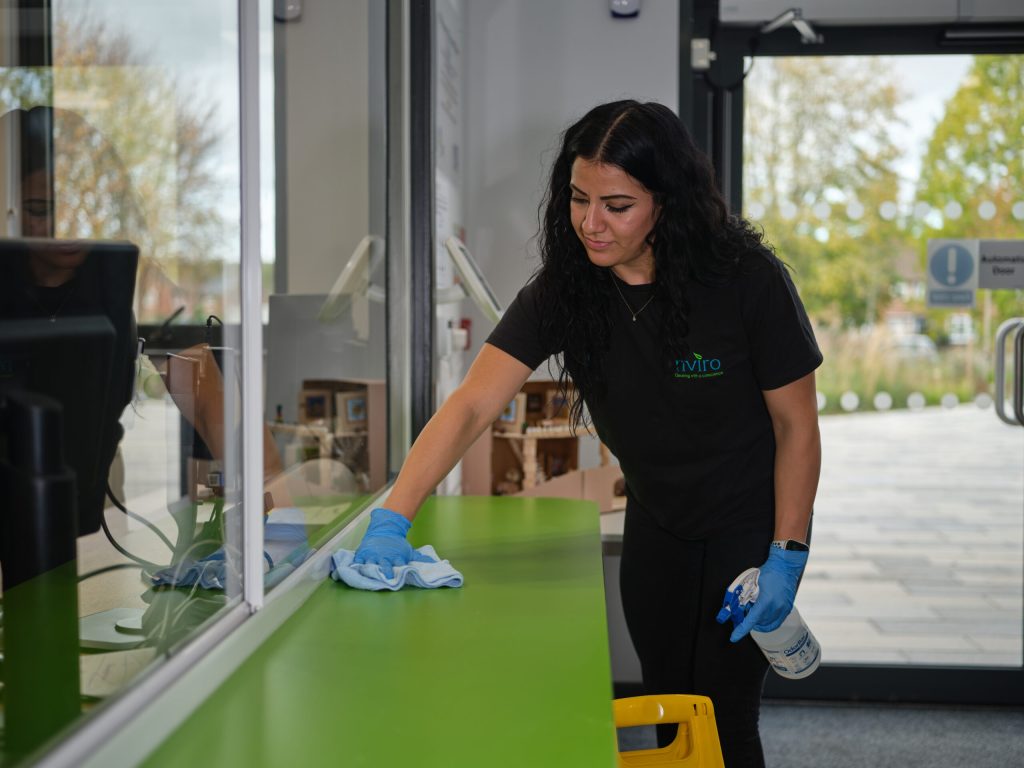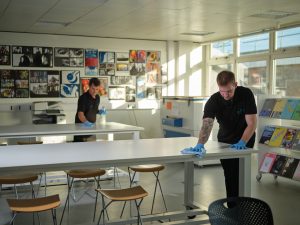Five things schools need to consider before retendering cleaning services
01 February 2023 Category: Nviro News Schools, Academies and Trusts
Every few years, schools and the councils in charge of their procurement will think, “it’s time to retender our cleaning services.” Contracts expire. Inflation raises prices. You have to prove that you’re not wasting taxpayers’ money. Retendering is the way to do it. Isn’t it?
Procurement teams are the experts here but most schools won’t have their own procurement teams and will have to source this externally. But as cleaning experts who’ve seen countless recurring pitfalls when it comes to retendering cleaning services specifically, we’ve compiled our thoughts about what to consider before you set things in motion.
- Ask: Do you need to go to tender?
In our experience, the people involved on site and at a local management level are often happy with their cleaning contracts. They’re comfortable that they are getting a good service, that they’ve ironed out the teething problems and are paying a fair price for a good service.
Nevertheless the same people find themselves going to tender because they have to prove they’re getting best value for good governance. Retendering is often the process for evidencing that they’re getting the best value – but it isn’t the only option.
Particularly if you don’t have an in-house procurement team, a benchmarking process can be a quicker, faster, and perfectly acceptable way of justifying expenditure. If going through a big, expensive exercise sounds exhausting, it may be helpful to know that benchmarking is simpler and entirely valid.
Your contract might be running smoothly, the expectations are clear, the team is robust, and the outcomes you want are generally being delivered – in other words, your buildings are clean, hygienic and safe. Change here isn’t always for the better, so benchmarking is good option. And it’s especially important when you have limited time and money to give a tender process justice.
- Consider the market
In our experience, procurement adds a 5% cost to a contract. Sometimes it’s there as a line item for everyone to see. Sometimes consultants keep the cost hidden. Either way, 5% is the average.
Many local authorities may be looking at their current contracts and baulking at, say, a 10% price increase. The response may be to shop around, to make sure you’re getting the most value. But the price increases you’re seeing with your current provider don’t exist in isolation – all cleaning companies are having to raise prices in line with inflation. So are you actually going to make a saving?
Retendering isn’t always a bad idea. But it’s worth knowing that you won’t find a reputable, reliable and financially sustainable company with prices unaffected by the cost of living crisis. Would you rather stay and be able to negotiate with your current provider on the terms of that increase, or leave and deal with the 5% extra and TUPE costs? If you are going to retender, make sure it’s for the right reasons.
- Longer contracts give better value
It may be time to rethink the model for cleaning contracts. Procurement teams offer contracts to sectors under certain industry standards. Building management typically gets 10-year contracts, and so does faculty. However, cleaning contracts are generally 3 years long, with a 2-year renewal period. But industry standards are only as good as their relevance to the industry. When the industry changes, standards must too.
3-plus-2 models used to work. Especially at a time when capital spending only extended to brushes, mops, and occasional small electrical items. However, if you were looking to set a contract in any field that involved investment in equipment today, outside cleaning, three years would be unheard of.
With shorter contracts, all capital spending happens at the beginning of the contract. If a piece of kit comes out during the lifespan of that contract, there’s rarely the financial tenure to justify that risk of investment.
For instance, we’re leasing specialist equipment for 40 weeks of the year for one short term contract. With a longer contract, we could buy the same equipment at a third of the cost and could pass that saving onto our client.
With other clients, we’ve agreed longer contracts. This enables us to save on capital spending and pass on that saving to them over the lifetime of the contract.
Of course, there are still performance measures, ensuring they receive value for money and can hold us to account for service delivery. But our longer contracts mean we’ve also been able to build a more meaningful relationship with those clients: learning their needs in more detail, introducing new-to-market equipment, and better adapting our service to them as time goes by.
- Prepare to pay more than expected
The estimated costs of your tender will always be incorrect unless you’ve done a detailed survey of your requirements, but in our experience, few clients can afford to perform these surveys upfront.
Procurement teams often submit the request to tender with a cleaning service based on the area of the floor plan. This isn’t enough to provide an accurate cost estimate. Floor-type also has an impact, as does accessibility and the location of the cleaning store. But apart from anything else, the square footage of each site is, in our experience, sometimes estimated or often incorrect.
There’s also often differences between the specification and the expectations of the building users. In some contracts, for instance, the tasks of ‘stacking and emptying a dishwasher’ or ‘stacking chairs and resetting desks in classrooms’ is expected by school building users, but it isn’t mentioned anywhere in the spec.
The result of this communication gap is either 1) users think the clearer are poor 2) cleaners need to fulfil these needs at the expense of other tasks or 3) the cleaners end up cleaning for more time than they’re paid for.
Without a thorough survey, the perfect quote is impossible. And this isn’t a small problem – we’ve seen tender contracts that have not differentiated their commercial kitchens and office kitchens. Others have asked us to clean buildings that don’t exist. Meanwhile with multi-site contacts, we can generally expect some buildings to get missed off altogether. And there was one contract that asked us to clean a set of two buildings at 5am on Christmas day, not considering our cleaners need holiday rates.
These aren’t the worst challenges we’ve sometimes seen in the world of cleaning and procurement. They’re recurring road bumps in a world where no project is perfect and every project succumbs to scope creep.
That said, there are ways to mitigate all this. After awarding a contract, some clients factor in a cost to re-survey the requirements to make sure the details are correct. This ensures that there are no surprises further down the term of the contract when buildings have been missed or the costs are higher than expected.
We’d recommend following suit. It means that once a supplier is chosen, your supplier can validate the information you have provided, correct discrepancies in the data, and adjust their prices accordingly.
If you don’t follow this process, you’ll still have to pay the difference between your data estimates and reality, but you’ll deny yourself (and your provider) the opportunity to plan for the gap.
- Hours aren’t the only metric
A lot of procurement teams want to measure the number of hours cleaning teams provide because it’s a flat metric. But as we’ve said before: hours aren’t the best measure of productivity.
Consider thirty hours of cleaners doing more hours with no supervision. Now consider a smaller team, with good, targeted supervision and planning, and add in the equipment and practices that allow the team to get more done. What’s more effective and gets you what you want?


